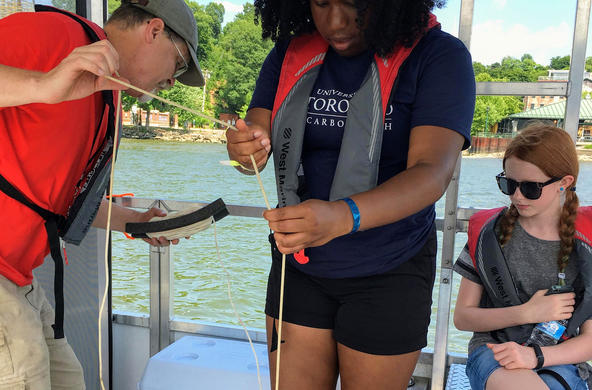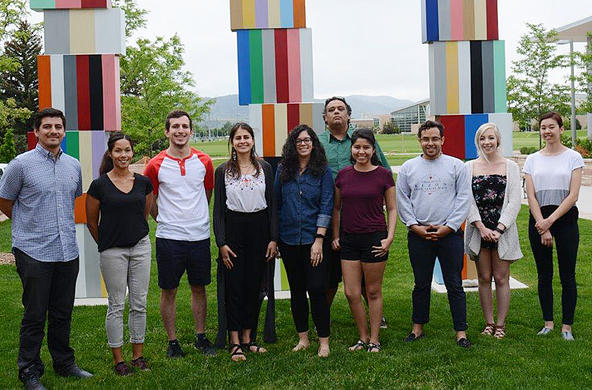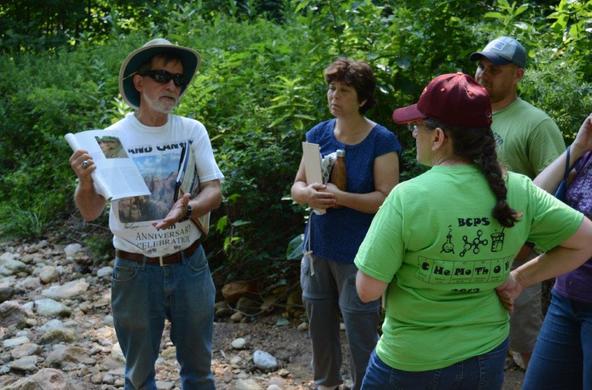Cary Institute is home to one of the nation’s longest running Research Experiences for Undergraduates (REU) programs. This National Science Foundation-supported program gives undergraduate students the opportunity to engage in rigorous independent research projects while working closely with scientist mentors.
Since welcoming our first undergrads in 1987, over 300 students have spent a summer immersed in ecological research alongside Cary scientists. Eleven students – nine based at Cary Institute in Millbrook, NY and two at the University of Notre Dame Environmental Research Center, situated on the Wisconsin-Michigan border – comprise the 2018 cohort.
Meet Cary Institute’s 2018 REU students

Kerste Milik
Home institution: Northeastern University
Cary mentors: Michael Fargione and Joshua Ginsberg
Research topic: What factors affect the vertebrate scavenger community at the Cary Institute?
What aspect of your project do you most enjoy?
"My favorite part of the project is looking at camera trap photos to see which animals visited my field sites. Vultures, coyotes, bears, bobcats, and more – every week is a new surprise. I'm happy to be contributing to a project that highlights the importance of scavengers in our ecosystem."
Paulina Murray
Home institution: Siena College
Cary mentor: Colin Fuss
Research topic: Carbon and nitrogen dynamics in forest soils
What’s been your most memorable moment in the field so far?
“On a sampling trip in the mountains of New Hampshire, I was walking a part of the Appalachian Trail with my mentor when we spotted two moose just ten feet away! My mentor had asked earlier if I thought we might see a moose today and I said it was unlikely!”
Melissa Yost-Bido
Home institution: Bard College
Cary mentor: Shannon LaDeau
Research topic: Effect of temperature and nutrient type on longevity of mosquitoes
Have you been surprised by any aspect of your work this summer?
“Mosquitoes are actually very picky about where and when they lay their eggs, which is contrary to what someone who is relentlessly bitten by mosquitoes might think about their omnipresence. And some wise words from my mentor: Research is just as much about troubleshooting as it is about collecting data.”
Rachael Mendoza
Home institution: Bard College
Mentors: Mike Hickerson and Isaac Overcast
Research topic: Human microbial communities
What have you learned about the process of science?
"One of the most valuable things I've learned about research is the importance of patience and thinking on your feet. Things never go as planned so you have to keep readjusting. I came here to obtain a better background in biological research through computer modeling, which I am, but I am also becoming – as so my mentor says – a hacker.”
Danielle Demateis
Home institution: The College of New Jersey
Cary mentor: Kathie Weathers
Research topic: Differences in temperature trends between inland lake surface water and surrounding land
How are you inspired by your research?
"Collecting your own data has its benefits, but working with existing satellite data broadens my project’s possibilities. I’m not limited to analyzing only field sites I can travel to. Instead, I can access lake data from across the world – and I can analyze that data on my computer anywhere I can sit down!"
Kari Dawson
Home institution: Winston Salem State University
Cary mentor: Kathie Weathers
Research topic: Ecological change in the Sky Lakes on the Shawangunk Ridge
How are you inspired by your research?
“Being an REU student at the Cary Institute is an amazing experience. The scientists I work with are incredibly helpful. I truly appreciate that this program holds all of us to a high standard. It makes me want to conduct good research, and continuously work on myself to improve.”
Sabrina Volponi
Home institution: Bridgewater College
Mentors: Kathie Weathers (Cary Institute) and Dave Richardson (SUNY New Paltz)
Research topic: Relationships between nitrogen species and phytoplankton growth
How are you inspired by your research?
“It is freeing to be at a place where asking questions is as important as finding answers. When I paddle onto Lake Minnewaska, nothing can touch me. I am a scientist and am going to make the world a better place.”
Claire Sickinger
Home institution: Bates College
Cary mentors: Stuart Findlay and Rhea Esposito
Research topic: Ecology of urban streams
How are you inspired by your research?
"Everything I'm doing right now is new to me: new methods and experimental designs, new instruments to measure water pollution, and new ways of analyzing my data. I knew that the REU experience would challenge me and I'm already seeing growth in myself as a researcher and as a scientist."
Paulina Frutos
Home institution: University of Connecticut
Cary mentor: Stuart Findlay
Research topic: The Hudson River wetland restoration at Gay's Point
Has your field work presented any unexpected challenges?
“Due to the tidal influence on water level, the freshwater marsh I'm studying is only accessible by kayak at high tide. So trips have to be timed for exactly an hour and a half before peak low tide, and we paddle through a field of spadderdock.”
Julia Barron
Home institution: Smith College
Cary mentor: Christopher Solomon
Research topic: Does coarse woody habitat density influence largemouth bass size structure and catch-per-unit-effort in north temperate lakes?
Spencer Phillips
Home institution: Murray State University
Cary mentor: Christopher Solomon
Research topic: Does fishing pressure correlate with size structure in largemouth bass in Northern Wisconsin lakes?





